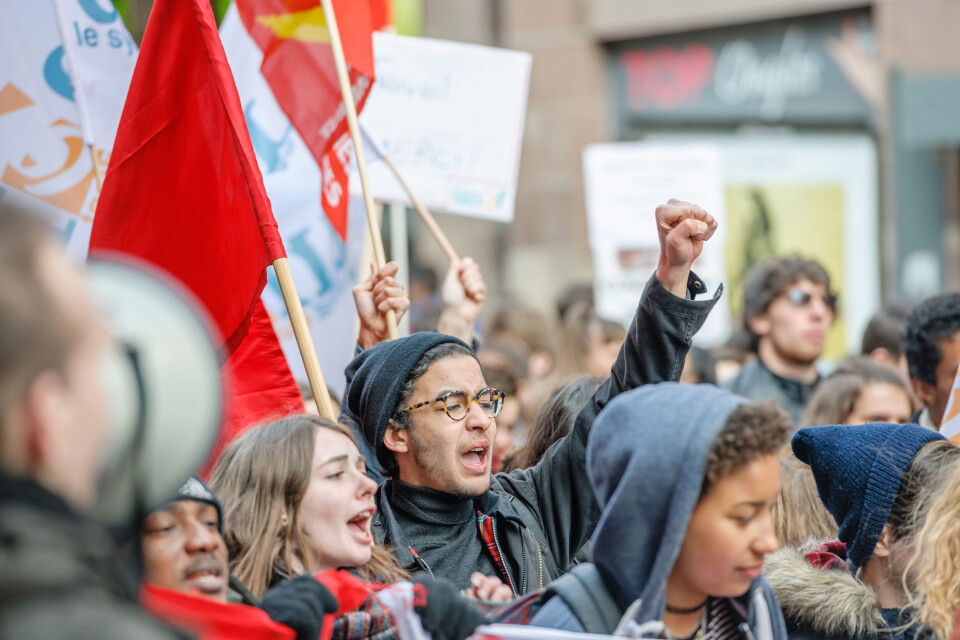-
French second-home visa issues raised in House of Lords
British people experience an "expensive and bureaucratic process" to continue living in France
-
More than 5,000 French communes use AI to identify poor rubbish sorting
Badly-sorted rubbish can cost millions so communes are turning to high-tech solutions
-
Tax on well-off retirees under consideration for 2026 budget
‘Nothing is off the table’ when it comes to finding €40 billion in savings says Labour Minister
French pension strike: union says it aims to ground all transport
Unions are calling for widespread action on January 19, largely in protest against the government’s plan to gradually increase the retirement age to 64

France’s main trade unions are calling for strike action across various sectors on January 19 in protest against the government’s pension reform bill which – among other things – includes a progressive increase of the retirement age from 62 to 64.
Read more: ‘Pension age rise in France is unnecessary and will worsen inequality’
This will mean that people will gradually have to make pension contributions for 43 years rather than 42 by 2027. Some régimes spéciaux – enabling workers in certain industries to retire early – will also be removed for new employees entering the profession, including SNCF.
For RATP workers in Paris, even those already on régime spécial schemes will retire two years later. For example, drivers will be able to retire aged 54 rather than 52, and station workers at 59 rather than 57, the CGC union has said.
The reform also includes an increase to the minimum monthly pension from €1,100 to €1,200.
Read more: Age, new minimum amount: What does France’s pension reform involve?
When unions staged a series of general strikes in December 1995 in response to government plans to change the retirement age of SNCF workers, they paralysed the transport system.
Now, SNCF unions CGT-Cheminots, Unsa-ferroviaire, SUD-Rail and CFDT-Cheminots are calling for significant action once again, with Unsa-ferroviaire stating: “Not one day, not one month, not one year more.”
CGT-RATP, which represents Paris transport workers, has also said: “We are expecting a strong mobilisation among employees. Our objective is to reach a ‘zero transport’ [situation], but we do not know if we will manage it.
“It will be hardline action, it will represent a barometer for the launch of a protest movement,” Régis Hoffman of CFDT-Cheminots Grand Est added.
Unions will then decide whether or how to continue action once they know how many people have taken part on Thursday.
Read more: French pension reform strike: what will next week’s protest look like?
Impact on other sectors
People working in the energy industry have also been called to strike, and the four biggest unions of this sector will meet on Monday January 16 to discuss their “plan of action”.
“We are expecting a very strong mobilisation on January 19,” the FCE-CFDT has stated, and the CGT has said that “power cuts” could occur.
The CGT has also called for strikes at refineries on January 19, January 26 and February 6, with, “if necessary, stoppages,” and “a halt to fuel delivery”.
Widespread action is also expected in hospital settings, which are under significant strain this winter.
Again, because of the nature of their work, which includes long days and night shifts, healthcare workers are often eligible to retire early, and even though the reform will retain this, they will in future have to work an extra two years.
However, hospital workers normally show their support for industry action by wearing a sticker reading ‘en grève’ (on strike) rather than actually walking out.
Teachers have been called to strike, and the SE-Unsa union has said: “We are hoping that [the action] will be significant but we know that there is also a lot of disappointment and resignation in the profession.”
Finally, police officers would also have to retire later in order to receive their full pension under the reform, an idea which is “unthinkable” to unions.
The pension reform bill is set to be debated by Parliament from January 23.
Related articles
‘Bono’s praise for Macron reminds French they could do worse’
























